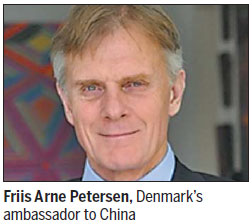Building on a long friendship

China and Denmark go back many years, facilitating ever closer ties, Danish Ambassador says
The relationship between Denmark and China is flourishing in business, science, culture, and many other areas. But this is no huge surprise, it's a relationship that goes back hundreds of years, says Friis Arne Petersen, ambassador of Denmark in China.
The Danish king began to send trading ships and expeditions to Asia and China as early as the 16th century, Petersen says. The first bilateral diplomatic relationship, established in 1908, never formally ended but just resumed after the founding of New China in 1949.
This year marks the 65th anniversary of the renewal of diplomatic relations between the two nations, and they are getting stronger as they go, Petersen says.
"The close cooperation between China and Denmark is very promising. What you see today is that a very big country in the East and a small country in the West actually can find extremely and surprisingly substantial cooperation in a large number of fields."
The ambassador noted that the governments of the two countries have agreements in a broad range of areas, including energy, environment, agriculture, food security, industry, trade, maritime services, science, intellectual property and anti-corruption.

Petersen says two of the most important milestones in the recent development of the relationship were two state visits: One in 2012, when then-president Hu Jintao visited Denmark, and the other last year, when Queen Margrethe II visited China with four ministers, five deputy ministers and a big business delegation.
Another achievement was reached in 2008 when the two countries entered a strategic, comprehensive partnership, which Petersen attributed to the long record of diplomatic relations and cooperation that few Western countries have had with China.
"History has not always been kind to China. It went through many rough periods over the last two centuries," he says. "But in the past 35 years, China's reforms have been successful in economic development, poverty eradication, social progress and cultural diversity.
"Without so many government-to- government agreements, we would not have such a free flow of commercial cooperation happening as we have," Petersen says.
The future, he says, will be more about deepening cooperation than exploring new areas.
In 2013, Denmark's exports in goods and services to China per capita was more than 1,300 euros, ranking second in the European Union, and its investment in China per capita was nearly 1,500 euros that year, also ranking second in the EU.
The ambassador says the investment climate in China "clearly has improved" since it became a member of the World Trade Organization in 2001.
"The Chinese leaders are trying to put more emphasis on the rule of law, and the Danish government likes that approach because this is the right way to develop the Chinese economy," he says. "And the Chinese government's willingness to make market forces the decisive factor in the economy is also a good signal."
However, he noted that although Danish investment in China increased tenfold over the past decade, Chinese investment in Denmark has remained low.
"We would like to have many more Chinese companies invest in Denmark, and our government has been open, with no negative approach or discriminatory policies," he says, adding that greenfield investment is the most welcome, including telecommunications, energy, agriculture and environmental technologies. Greenfield investment is when a company starts a new venture abroad by creating new facilities.
In 2013, Chinese electronics company Huawei signed a contract with TDC, the biggest telecom operator in Denmark, to build a 4G network worth more than $700 million (623 million euros) in that country.
Denmark has applied to become a founding member of the Asian Infrastructure Investment Bank proposed by China. The ambassador says that the bank is important in three ways.
"The first outcome of the regional development bank is to create economic activities that will help eradicate poverty," he explains.
"It is also important to have a regional development bank with major international participation from both Asia and other parts of the world, so that the bank can really be an international operation, open and inclusive."
Next, because globalization is "more effective than ever before", he says, it is imperative that Asia's growth is integrated with global growth, so the international institution also creates interests for small countries in the West such as Denmark, which has a big investment in China and a large amount of trade with China.
Other parts of the China-Denmark exchanges are not ignored, either. Danish Cultural Season in China was launched in September 2014 in an effort to strengthen collaboration between major cultural stakeholders in both countries. The program will run until July.
zhangzhao@chinadaily.com.cn
(China Daily European Weekly 05/08/2015 page21)
Today's Top News
- Japan tempting fate if it interferes in the situation of Taiwan Strait
- Stable trade ties benefit China, US
- Experts advocate increasing scope of BRI to include soft power sectors
- New engine powers cargo drone expansion
- China to boost green industry cooperation
- Manufacturing PMI rises in November






























